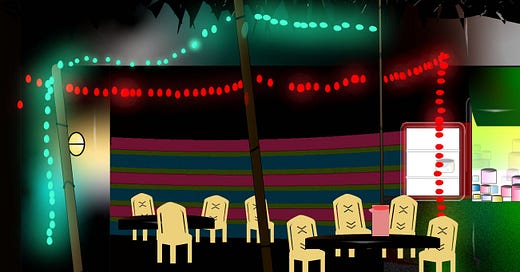I watched All We Imagine as Light (‘Imagine’)* the same week as its India release, towards the end of November. I have forgotten the minutiae of the movie, even the much-acclaimed music. I have not consciously returned to it in any way. Yet, I remain possessed by it. It is not a movie one remembers by punch lines, through elaborate soliloquies or “hook-steps” that so many movies try to make a mark on us, the citizens of the Internet Republic with byte-sized memories. I wager this is a conscious choice, and what a choice it is. It could have so easily slipped into platitudes. There is the wife who is abandoned by an NRI (albeit working-class) husband — a narrative about patriarchy in its external and internalised forms is right there. We have a young woman caught in an inter-religious romance. We could have had many, many moments made out to show how love transcends all in our violent times, a la ‘Bombay,’ a movie with similarly rousing music that I love dearly until Arvind Swamy starts monologing in the climax. We also never get to see an older working-class woman taking on the Goliathan real-esate developers of Mumbai when cinema could have made that possible. She does not even have any kaagaz to defend herself. There could have been a movie like Parched about female solidarity and friendship. A movie like The Lunch Box with its incomplete but all too human relationships in Maximum City. It could have been a film with a Message.®
Instead, we have a movie that is listless. Its listlessness is seen in how Anu twiddles her thumbs, constantly bored in her duties as a nurse. There is no purpose, no point in showing us Parvaty’s struggle against eviction because it does not give us the anticipated, satisfactory ending of victory. Parvaty simply returns to her hometown. Prabha’s husband does not come back, we are left with only a sequence that blurs reality and remembrance.
I asked an extremely non-cinephilic friend who I had reluctantly dragged to the theatre to watch it with me whether they liked it. The response was something along the lines of how “it was not bad, but I didn’t like it so much because there was no plot.” Kapadia has enough fans who would take up arms against someone for saying this. But I do not disagree with it. There is no plot in Imagine because it is a movie about desire, and desire by its very nature cannot be plotted. Desire cannot be contained within linear storylines, or neat screenplays where one scene logically flows into the next. It cannot be choreographed or even captured conventionally. There are extended silences in the movie because desire escapes language. It is appropriate that the movie has no single language. There is Malayalam, Hindi, and Marathi because desire cannot be spoken of in just one tongue. It runs mad when we try to pin it within cardinal points whose locations we know.
I exited the theatre hall and traipsed around a mall’s food court after the movie, dazed. I was too lost in ambiguity to act with intention, not wanting to eat anything, or even speak anything. I have only lately begun to see myself as a desiring person. I have for long not been perceived as such and I know I am not permitted to be one. I do not speak of my desires loudly or write angry poems about them and how they have been repressed. Maybe I should. For the most part, I am like Prabha, the quiet older nurse in the movie. Like her, to avoid looking inside, I simply look out, out of the metro train or rickshaw windows. There is a scene in the film where Anu and her lover go exploring some strange abandoned monument. There are proclamations of love made by couples before them through vandalism. They are braver than me. I do not dare write down my desires and give them a name because I am terrified of what it would yield.
When desire is unnameable, unpinnable, and unspeakable, cinema perhaps cannot ever properly decipher it to us. It can only show us its aftermath. Parvaty does not desire the ocean but her desires feel like the unstoppable waves crashing onto the shores of Ratnagiri. Prabha does not desire the rice cooker or its sender, but we know that whatever her desires are, it makes her muscles clench up at that inanimate machine. Desire creeps up gently, much like how the movie lingers in my mind. I cross the road, my hand dangling at my side, waiting for desire to hold it and not let go.
Many thanks to my friend Abhinav (@jaintle) for allowing me to use his poster as the thumbnail image for this piece.
*I refuse to abbreviate the movie to AWIAL, as it sounds too close to aviyal, a vegetable stew dish from Kerala. The title then sounds like a comedy movie about a Palakaddi chef starring Vineet Sreenivasan.



